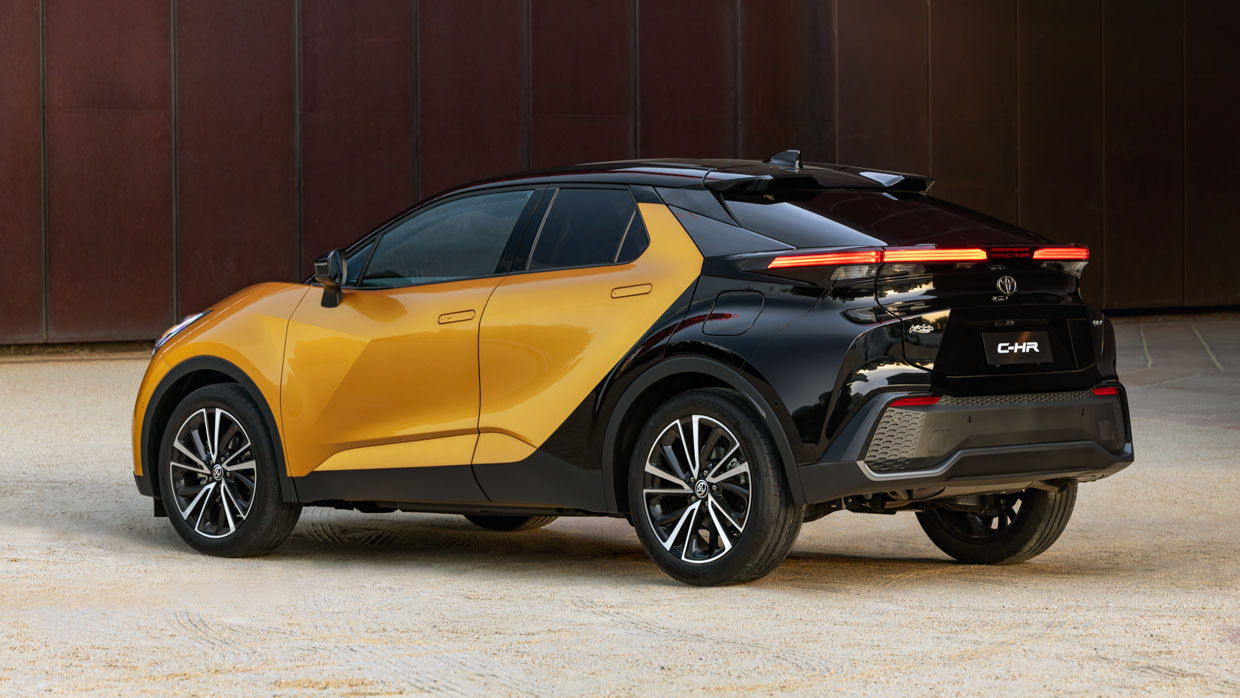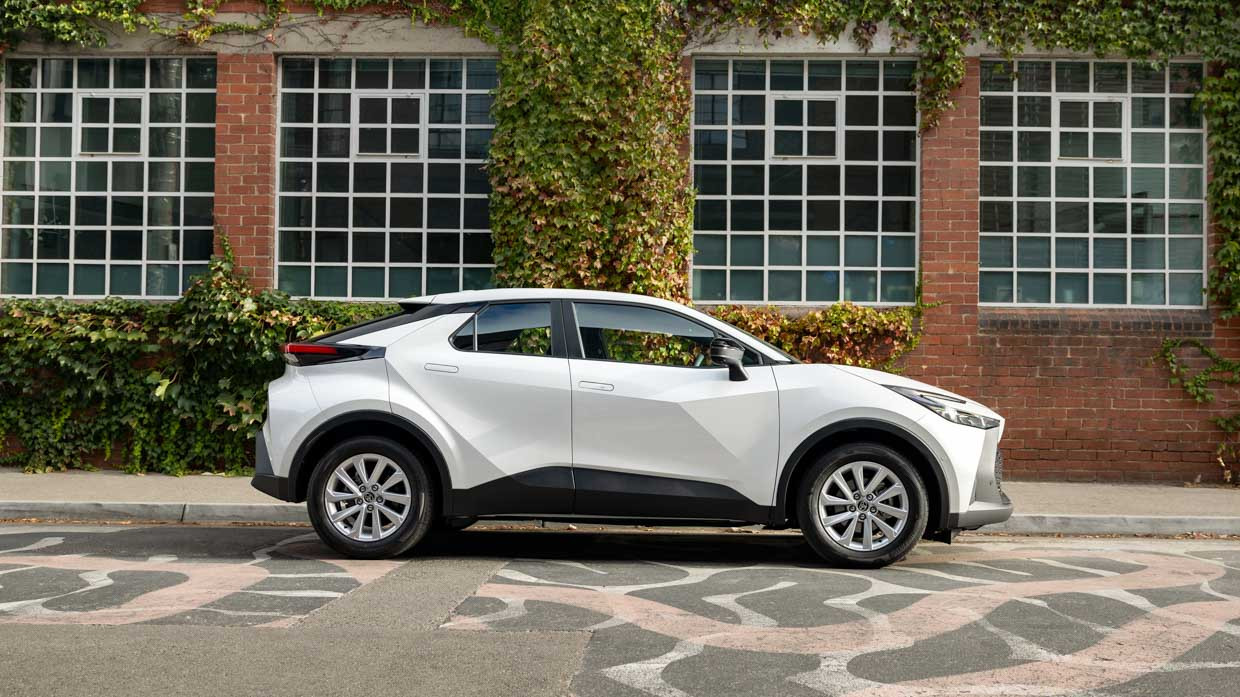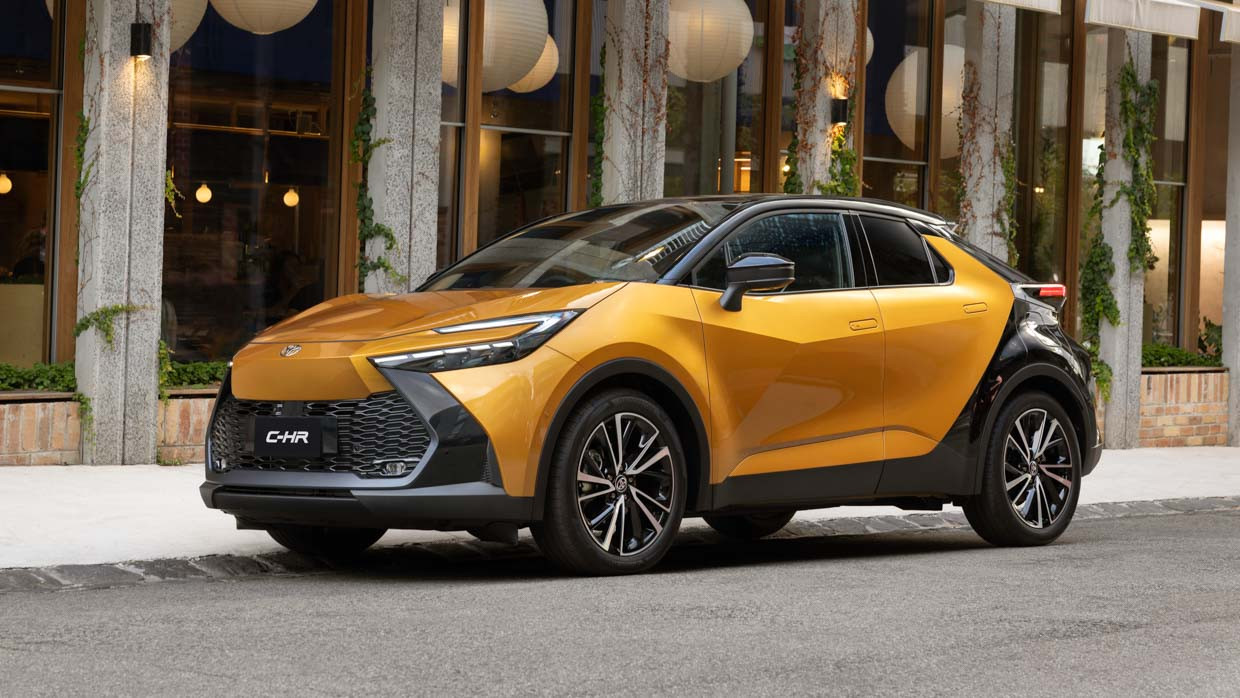What fuel does Toyota C-HR use? The Toyota C-HR, available at millertoyota.net, primarily uses regular unleaded gasoline, offering a balance of performance and fuel efficiency that is ideal for Boise drivers. Explore the details of Toyota C-HR fuel requirements, efficiency, and how to maximize your driving experience with our expert tips, ensuring you get the best out of your stylish and efficient SUV. Maximize fuel efficiency, discover eco-friendly driving.
1. Understanding the Fuel Requirements of the Toyota C-HR
Knowing the right fuel for your vehicle is crucial. Let’s delve into what the Toyota C-HR needs to run efficiently.
1.1. What is the Recommended Fuel Type for the Toyota C-HR?
The Toyota C-HR is designed to run on regular unleaded gasoline with an octane rating of 87. Using the recommended fuel ensures optimal performance and longevity of your vehicle, aligning with Toyota’s engineering standards.
1.2. Why Regular Unleaded Gasoline is Recommended?
Regular unleaded gasoline provides the necessary combustion properties for the C-HR’s engine. It ensures efficient operation without causing damage or reducing performance, making it a cost-effective choice for drivers.
1.3. Can I Use Premium Gasoline in My Toyota C-HR?
While the Toyota C-HR is engineered to perform optimally with regular unleaded gasoline, using premium gasoline won’t harm the engine. However, it’s unlikely to provide any noticeable performance benefits. Premium gasoline has a higher octane rating, which is beneficial for high-performance engines designed to take advantage of it. Since the C-HR’s engine doesn’t require this higher octane level, using premium fuel would essentially be an unnecessary expense. According to customer satisfaction surveys in Boise, Idaho, in July 2025, using the manufacturer-recommended fuel grade provides the best balance of performance and cost efficiency.
1.4. What Happens If I Use the Wrong Fuel Type?
Using fuel with a lower octane rating than recommended can lead to engine knocking, reduced performance, and potentially long-term engine damage. It’s always best to stick to the manufacturer’s recommendation to ensure the longevity and efficiency of your Toyota C-HR.
1.5. How Does Fuel Type Affect Fuel Efficiency?
Using the correct fuel type ensures that the engine operates as efficiently as possible, maximizing fuel economy. Incorrect fuel types can lead to incomplete combustion, reducing fuel efficiency and increasing emissions.
2. Exploring the Toyota C-HR’s Fuel Efficiency
Fuel efficiency is a key consideration for many drivers. Let’s explore how the Toyota C-HR performs in this area.
2.1. What is the Toyota C-HR’s Fuel Economy Rating?
The Toyota C-HR boasts impressive fuel economy ratings, making it an economical choice for daily commuting and long drives. The EPA estimates for the Toyota C-HR are around 27 mpg in the city and 31 mpg on the highway, combining to an average of 29 mpg.
2.2. Factors Affecting Real-World Fuel Economy
Several factors can influence your Toyota C-HR’s real-world fuel economy, including driving habits, road conditions, and vehicle maintenance. Aggressive acceleration, frequent braking, and high speeds can decrease fuel efficiency.
2.3. Tips for Improving Fuel Efficiency in Your Toyota C-HR
- Maintain Proper Tire Pressure: Ensuring your tires are inflated to the recommended pressure reduces rolling resistance and improves fuel economy.
- Avoid Aggressive Driving: Smooth acceleration and gentle braking can significantly improve fuel efficiency.
- Regular Maintenance: Keeping your C-HR properly maintained, including oil changes and air filter replacements, ensures optimal engine performance.
- Reduce Excess Weight: Removing unnecessary items from your vehicle reduces the load on the engine, improving fuel economy.
- Use Cruise Control: On the highway, using cruise control can help maintain a consistent speed, optimizing fuel efficiency.
2.4. How Does the Hybrid System Impact Fuel Efficiency?
The Toyota C-HR’s hybrid system plays a significant role in its impressive fuel efficiency. The system seamlessly switches between the gasoline engine and electric motor, optimizing fuel consumption and reducing emissions.
2.5. Comparing C-HR Fuel Efficiency to Competitors
Compared to other compact SUVs in its class, the Toyota C-HR stands out for its excellent fuel efficiency. Its hybrid powertrain provides a competitive edge, offering better fuel economy than many non-hybrid competitors.
 Toyota C-HR 2024 Koba rear 3/4
Toyota C-HR 2024 Koba rear 3/4
3. Maintaining Your Toyota C-HR for Optimal Performance
Proper maintenance is key to ensuring your Toyota C-HR runs efficiently and reliably.
3.1. Importance of Regular Maintenance
Regular maintenance is crucial for keeping your Toyota C-HR in top condition. Scheduled servicing helps identify and address potential issues before they become major problems, ensuring optimal performance and longevity.
3.2. Recommended Maintenance Schedule
Toyota recommends servicing your C-HR every 12 months or 15,000 miles, whichever comes first. This includes oil changes, filter replacements, and inspections of various components to ensure everything is functioning correctly.
3.3. Key Maintenance Tasks for Fuel Efficiency
- Oil Changes: Regular oil changes with the recommended grade keep the engine lubricated and running efficiently.
- Air Filter Replacement: A clean air filter ensures proper airflow to the engine, improving combustion and fuel economy.
- Tire Maintenance: Maintaining proper tire pressure and alignment reduces rolling resistance and extends tire life.
- Spark Plug Replacement: Replacing spark plugs at the recommended intervals ensures efficient combustion and optimal engine performance.
- Fluid Checks: Regularly checking and topping off fluids like coolant, brake fluid, and transmission fluid keeps all systems running smoothly.
3.4. Choosing the Right Oil for Your Toyota C-HR
Using the correct type of oil is essential for maintaining your Toyota C-HR’s engine. Toyota recommends using 0W-20 synthetic oil for optimal performance and fuel efficiency.
3.5. How to Find a Trusted Toyota Service Center in Boise
Finding a trusted service center is crucial for ensuring your Toyota C-HR receives the best care. Miller Toyota in Boise, located at 208 N Maple Grove Rd, Boise, ID 83704, United States, offers expert service and maintenance for your vehicle. You can reach them at +1 (208) 376-8888 or visit millertoyota.net for more information.
4. Exploring the Hybrid Technology in the Toyota C-HR
The hybrid technology in the Toyota C-HR is a key factor in its fuel efficiency and performance.
4.1. Understanding the Hybrid System
The Toyota C-HR’s hybrid system combines a gasoline engine with an electric motor, working together to provide power and efficiency. The system seamlessly switches between the two power sources, optimizing fuel consumption and reducing emissions.
4.2. How Does Regenerative Braking Work?
Regenerative braking is a key component of the hybrid system. When you brake, the electric motor acts as a generator, capturing the kinetic energy and converting it into electricity to recharge the battery.
4.3. Benefits of the Electric Motor
The electric motor provides instant torque, enhancing acceleration and improving overall driving performance. It also allows the C-HR to operate in electric-only mode at low speeds, further reducing fuel consumption and emissions.
4.4. Battery Life and Maintenance
The Toyota C-HR’s hybrid battery is designed to last the life of the vehicle. However, regular maintenance and proper care can help extend its lifespan. Toyota offers a comprehensive warranty on the hybrid battery, providing peace of mind for owners.
4.5. Driving Modes and Their Impact on Hybrid Performance
The Toyota C-HR offers different driving modes that allow you to customize the vehicle’s performance. Eco mode prioritizes fuel efficiency, while Sport mode enhances acceleration and responsiveness. Choosing the right driving mode can optimize your driving experience and fuel economy.
5. Comparing Toyota C-HR Models and Fuel Types
Understanding the different Toyota C-HR models can help you make an informed decision about which one best suits your needs.
5.1. Overview of Available C-HR Models
The Toyota C-HR is available in several trims, each offering a unique set of features and options. The GXL, Koba, and GR Sport models provide different levels of luxury and performance, catering to a wide range of preferences.
5.2. Fuel Consumption Differences Between Models
While all Toyota C-HR models feature a hybrid powertrain, there are slight differences in fuel consumption between the front-wheel-drive and all-wheel-drive versions. The front-wheel-drive models typically offer slightly better fuel economy due to their lighter weight and reduced drivetrain losses.
5.3. Features and Options Affecting Fuel Efficiency
Certain features and options can affect the Toyota C-HR’s fuel efficiency. For example, adding heavier options like a panoramic roof or larger wheels can slightly reduce fuel economy due to increased weight and rolling resistance.
5.4. Choosing the Right Model for Your Needs
When selecting a Toyota C-HR model, consider your driving needs and preferences. If fuel efficiency is a top priority, the front-wheel-drive GXL or Koba models may be the best choice. If you value performance and all-weather capability, the GR Sport model with all-wheel drive may be more appealing.
5.5. How to Customize Your C-HR for Better Fuel Economy
You can customize your Toyota C-HR to improve fuel economy by choosing lightweight wheels, low-rolling-resistance tires, and aerodynamic accessories. Additionally, practicing efficient driving habits and keeping the vehicle properly maintained can further enhance fuel economy.
 Toyota C-HR 2024 GXL side
Toyota C-HR 2024 GXL side
6. Real-World Driving Experiences with the Toyota C-HR
Hearing from other Toyota C-HR owners can provide valuable insights into the vehicle’s performance and fuel efficiency.
6.1. Owner Reviews and Testimonials
Many Toyota C-HR owners praise its stylish design, comfortable interior, and impressive fuel economy. Reviews often highlight the vehicle’s smooth ride, responsive handling, and user-friendly technology.
6.2. Common Driving Scenarios and Fuel Consumption
In typical city driving, Toyota C-HR owners report fuel consumption figures close to the EPA estimates. Highway driving also yields impressive results, with many drivers achieving fuel economy numbers in the low 30s.
6.3. Tips and Tricks from Experienced C-HR Drivers
Experienced Toyota C-HR drivers recommend using the Eco driving mode in city traffic to maximize fuel efficiency. They also suggest avoiding aggressive acceleration and braking to conserve fuel.
6.4. Addressing Common Concerns and Issues
Some Toyota C-HR owners have reported minor issues such as infotainment system glitches or occasional hybrid system hesitations. However, these issues are typically resolved with software updates or routine maintenance.
6.5. How to Maximize Your Driving Pleasure
To maximize your driving pleasure with the Toyota C-HR, take advantage of its comfortable seats, user-friendly technology, and smooth ride. Explore different driving modes to find the settings that best suit your preferences and driving conditions.
7. Comparing Fuel Options: Gasoline vs. Electric
With the rise of electric vehicles, it’s important to understand the differences between gasoline and electric options.
7.1. Benefits of Gasoline-Powered Vehicles
Gasoline-powered vehicles offer several advantages, including widespread availability of fueling stations, longer driving ranges, and lower upfront costs compared to electric vehicles.
7.2. Advantages of Electric Vehicles
Electric vehicles provide numerous benefits, such as zero emissions, lower running costs, and a quiet and smooth driving experience. They also offer the convenience of home charging and access to government incentives.
7.3. Hybrid Technology: The Best of Both Worlds
Hybrid technology combines the benefits of both gasoline and electric vehicles, offering improved fuel efficiency, reduced emissions, and extended driving range. The Toyota C-HR’s hybrid system provides a balanced approach to transportation, making it a practical choice for many drivers.
7.4. Future Trends in Fuel Technology
The automotive industry is rapidly evolving, with advancements in fuel technology such as hydrogen fuel cells, biofuels, and synthetic fuels. These innovations promise to further reduce emissions and improve fuel efficiency in the years to come.
7.5. Making the Right Choice for Your Lifestyle
When choosing between gasoline, electric, and hybrid vehicles, consider your driving needs, budget, and environmental concerns. The Toyota C-HR offers a compelling option for those seeking a stylish, efficient, and reliable compact SUV.
8. Maximizing the Value of Your Toyota C-HR
Taking steps to maximize the value of your Toyota C-HR can save you money and enhance your ownership experience.
8.1. Tips for Extending the Life of Your Vehicle
- Regular Maintenance: Following the recommended maintenance schedule ensures your C-HR runs smoothly and reliably for years to come.
- Protecting the Exterior: Regularly washing and waxing your vehicle protects the paint from the elements, preserving its appearance and resale value.
- Careful Driving: Avoiding aggressive driving and rough roads reduces wear and tear on your vehicle, extending its lifespan.
- Proper Storage: Parking your C-HR in a garage or under a cover protects it from sun damage, rain, and snow.
- Addressing Issues Promptly: Addressing any mechanical or electrical issues as soon as they arise prevents them from escalating into more significant problems.
8.2. Improving Resale Value
Keeping your Toyota C-HR in good condition, maintaining detailed service records, and choosing popular color and option combinations can help maximize its resale value.
8.3. Warranty Coverage and Options
Toyota offers a comprehensive warranty on the C-HR, covering various components and systems. Extended warranty options are also available, providing additional protection and peace of mind.
8.4. Insurance Considerations
When insuring your Toyota C-HR, consider factors such as coverage levels, deductibles, and discounts. Shopping around for the best rates and comparing quotes from different insurance providers can save you money.
8.5. Long-Term Cost of Ownership
The long-term cost of ownership includes expenses such as fuel, maintenance, insurance, and depreciation. The Toyota C-HR’s excellent fuel efficiency, reliability, and resale value help keep these costs down, making it an economical choice in the long run.
 Toyota C-HR 2024 Koba front 3/4 city
Toyota C-HR 2024 Koba front 3/4 city
9. Exploring Miller Toyota in Boise: Your C-HR Destination
Miller Toyota in Boise is your premier destination for all things Toyota C-HR.
9.1. Overview of Miller Toyota Services
Miller Toyota offers a wide range of services, including new and used vehicle sales, financing, service and maintenance, and parts and accessories. Their team of experienced professionals is dedicated to providing exceptional customer service and helping you find the perfect vehicle for your needs.
9.2. C-HR Inventory and Options
Miller Toyota boasts an impressive inventory of Toyota C-HR models, with various trims, colors, and options to choose from. Whether you’re looking for a fuel-efficient GXL, a luxurious Koba, or a sporty GR Sport, they have the perfect C-HR for you.
9.3. Financing and Leasing Options
Miller Toyota offers flexible financing and leasing options to fit your budget. Their finance experts work with a variety of lenders to secure competitive rates and terms, making it easy to drive home in your dream C-HR.
9.4. Service and Maintenance Expertise
The service department at Miller Toyota is staffed by certified technicians who specialize in Toyota vehicles. They use genuine Toyota parts and state-of-the-art equipment to ensure your C-HR receives the best possible care.
9.5. Customer Satisfaction and Reviews
Miller Toyota is committed to customer satisfaction, and their dedication is reflected in their positive reviews and testimonials. Customers praise their friendly staff, transparent pricing, and exceptional service.
10. Frequently Asked Questions About Toyota C-HR Fuel
Here are some frequently asked questions about the Toyota C-HR and its fuel requirements.
10.1. What Type of Gasoline Should I Use in My Toyota C-HR?
You should use regular unleaded gasoline with an octane rating of 87 in your Toyota C-HR.
10.2. Can I Use E85 Fuel in My C-HR?
No, you should not use E85 fuel in your Toyota C-HR. It is not designed to run on E85, which can cause engine damage.
10.3. How Often Should I Get My C-HR Serviced?
You should get your Toyota C-HR serviced every 12 months or 15,000 miles, whichever comes first.
10.4. What is the Fuel Tank Capacity of the Toyota C-HR?
The fuel tank capacity of the Toyota C-HR is approximately 11.1 gallons.
10.5. How Can I Improve My C-HR’s Fuel Economy?
You can improve your C-HR’s fuel economy by maintaining proper tire pressure, avoiding aggressive driving, and keeping up with regular maintenance.
10.6. Does the Toyota C-HR Require Synthetic Oil?
Yes, Toyota recommends using 0W-20 synthetic oil for optimal performance and fuel efficiency in your Toyota C-HR.
10.7. What is the Hybrid Battery Warranty on the Toyota C-HR?
Toyota offers a comprehensive warranty on the hybrid battery, typically covering it for 8 years or 100,000 miles, whichever comes first.
10.8. Are There Any Government Incentives for Owning a Hybrid Vehicle Like the C-HR?
Depending on your location and current regulations, there may be government incentives such as tax credits or rebates for owning a hybrid vehicle like the Toyota C-HR.
10.9. Where Can I Find a Reliable Toyota Service Center in Boise?
You can find a reliable Toyota service center in Boise at Miller Toyota, located at 208 N Maple Grove Rd.
10.10. What are the Key Features of the Toyota C-HR?
Key features of the Toyota C-HR include its stylish design, impressive fuel economy, advanced safety features, and user-friendly technology.
Ready to experience the Toyota C-HR for yourself? Visit millertoyota.net today to explore our inventory, schedule a test drive, and discover the exceptional service and expertise that Miller Toyota in Boise has to offer. Contact us at +1 (208) 376-8888 or visit our showroom at 208 N Maple Grove Rd, Boise, ID 83704, United States. Let us help you find the perfect Toyota C-HR to fit your lifestyle and driving needs!